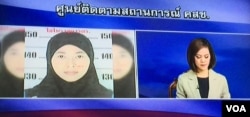Thai authorities on Thursday announced they have arrested a third suspect allegedly connected to last month’s fatal shrine bombing in Bangkok.
Kamarudeng Saho, 38, identified as a Thai Muslim, was apprehended in the southern province of Narathiwat, and is now undergoing military interrogation, according to officials who said he is being held under Article 44, which replaced martial law and gives the junta sweeping powers.
The junta, in a mid-day televised announcement about the case, named the two foreign men who are also in custody as Adem Karadak and Yusufu Meerailee. Their nationalities were not mentioned.
“The issuance of the said arrest warrants has been in full accordance with international principles at the investigative stage,” said Army Colonel Winthai Suvaree. “The verification of any hypothesis needs to take into consideration all sufficient witness accounts and evidence.”
The warrants have been issued for eight people since the August 17 Erawan Shrine blast, including a Thai woman and four foreign men —only one specifically identified as a Turkish national.
On the same nationwide broadcast, TV newscaster 2nd Lt. Pareya Netrawichien announced the junta “would like to discourage spreading misleading opinions which may cause confusion among the public.”
The public is being cautioned daily not to spread rumors on social media about the bombing while being assured by the junta that those investigating “are capable personnel and experts who are putting their best efforts in cautiously solving the case.”
Public confidence in the investigation has been undermined by contradictory information issued by authorities and suspicions about transparency in a country under military control and a notoriously corrupt police force.
Thai officials have told reporters that they have been ordered not to characterize the bombing as a terrorist attack so as not to harm Thailand's important tourism industry and in view of the closer relationship with China since last year's coup in the kingdom.
Thai media, for the first time, however, are now openly drawing a possible link between the bombing – which killed 20 people – and Thailand's deportation in July of more than 100 ethnic Uighurs.
Following their forcible return to China, violent protests in Istanbul targeted the Thai and Chinese missions.
Turkey's diplomatic mission in Bangkok on Thursday expressed skepticism about reported links to its nationals and frustration with a lack of satisfactory communication with Thai officials.
“There are also certain press reports with regard to arrest warrants having been issued for certain Turkish nationals. Up to now this embassy has not received any official notification from the Thai authorities concerning the arrest warrants,” according to a statement from the Turkish Embassy.
The Turkish foreign ministry spokesperson said information had been requested from the Thai Embassy in Ankara and through Interpol, but “we haven't received a reply yet.”
Raids on apartments Saturday and Sunday resulted in the arrest of Karadek, stacks of fake Turkish passports and explosives and other materials police said were for making bombs.
Meerailee was arrested by Thai authorities on Wednesday. Officials in Bangkok deny comments attributed to unnamed Thai and Cambodian officials saying he was captured at Phnom Penh's airport August 30 attempting to catch a flight out of Cambodia for Turkey. Thai police and military insist a joint patrol of immigration police and soldiers caught him as he tried to flee into Cambodia from the border in Sa Kaeo province, noting that he resembled the shrine bomber in a yellow shirt seen on closed circuit television images.








